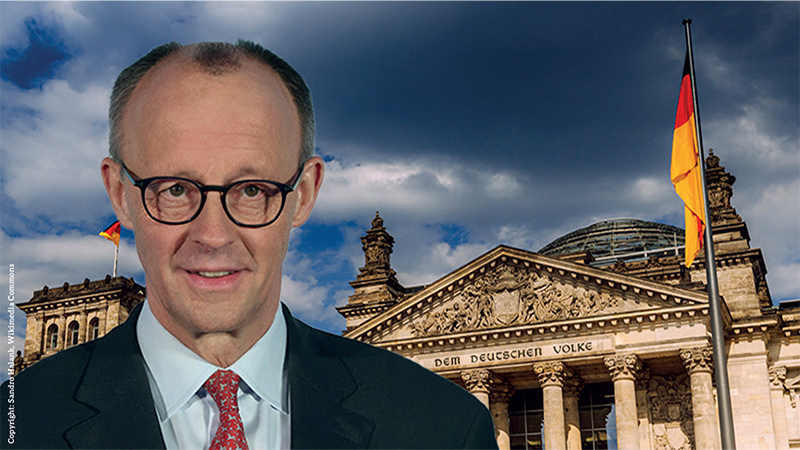Friedrich Merz (pictured) is set to become Germany’s new chancellor after the Christian Democrats won the largest share of seats in the Bundestag during yesterday’s German federal elections.
While the AfD effectively doubled its support to become the second largest party, the results were broadly in line with expectations.
“In the end, the results of the German elections were probably just about as benign as the investment markets could have hoped for,” Chris Hiorns, head of European equities at EdenTree Investment Management, said.
See also: Morningstar: Political clarity could lift German equities
“The prospect of coalition between CDU/CSU and the SPD or a wider coalition including the Green Party should ensure a great deal of continuity in policy with a shift towards more business-friendly policies.
“For sustainable funds such as our own, the inclusion of the Green Party in any coalition would ensure that Germany’s strong reputation as a leader in environmentally friendly policies should continue, and should help ensure that they remain at the heart of EU policymaking as well.
“This would be especially important as support for green policies has dropped globally and appears to be abandoned entirely in the US under Trump.”
What are the implications for markets?
On the morning after the result, the DAX index was up 0.77%, (as of 11:30am GMT), while the European STOXX 600 rose 0.15%.
Hiorns added that, despite the overall positive outcome for the equity markets, Germany remains in a difficult position. Its economy has been challenged by a sharp drop in demand for high-end vehicles from the Chinese market, the impact of the loss of cheap gas supplies from Russia and the potential impact of more restrictive Trump-led US trade policies.
“The geopolitical situation also remains fraught with the sharp U-turn in support for Ukraine by the Trump administration increasing the need for European countries to spend more in defence and prioritise other areas.
“We are therefore cautiously optimistic on the result this morning, and eagerly await updates on coalition negotiations, formations, and policy implications in the coming weeks and months, which will be crucial catalysts for the continued outperformance of European markets this year.”
Debt brake reform
In the run-up to the election, reforming the German debt brake was discussed by parties and former politicians alike to help to grow the economy.
Kim Catechis, investment strategist at Franklin Templeton Institute, said that while policy proposals during the campaign included some level of debt brake reform, they were “probably not to the degree” that capital markets would like.
“Markets will also be looking for the establishment of a special purpose fund (or funds), which could be quickly launched to allow greater expenditure on defense, infrastructure and energy.
“Investors are expecting lower corporate tax and stable electricity costs for industrial customers, although should remember that structural changes take time, and the benefits will only be seen from 2026.
“Equity investors are focused on the CDU/CSU proposals to reduce the corporate tax rate from 30.8% to 25% over four years. Analysts estimate this could boost earnings for equities by 1.1% in 2027 and up to 1.9% in 2029. The sectors that would likely benefit most are defense, utilities, capital goods, autos, property and, to a lesser extent, banks and chemicals.”
He added that currency markets are almost exclusively focused on the potential reform of the debt brake, which would require a two-thirds majority in the Bundestag.
PA Event: Portfolio Adviser Spring Congress 2025
On the impact for fixed income markets, Nuveen’s Laura Cooper, head of macro credit and global investment strategist, added: “We continue to favour German bunds and see scope for the 10y yield to trade closer to 2.25% by year-end given the degree of fiscal hopes baked in and downside growth risks.
“Euro upside could similarly be limited given the trifecta of benign tariffs, German stimulus hopes, and a Russia-Ukraine peace accord, that have driven the recent rally, still ostensibly on shaky ground.”
This story was written by our sister title, Portfolio Adviser








